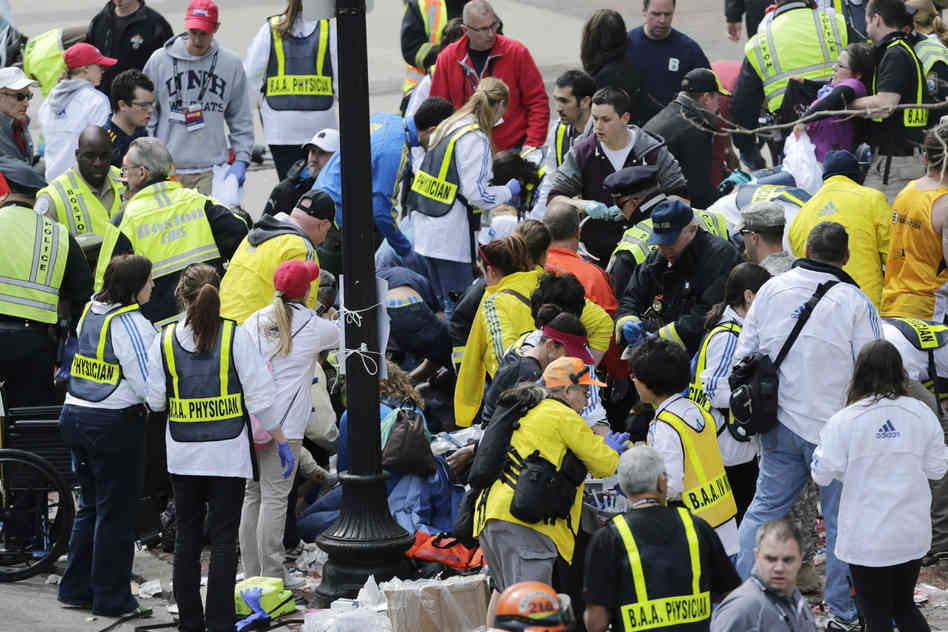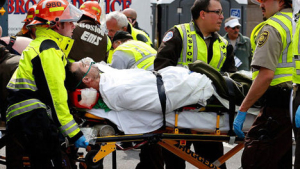Coping with Tragedy | Fear, Anxiety and Grief after Boston Marathon Bombing | 3 Tips to Cope with Virtual Trauma |Trauma Counselor
Are we safe? Are our children safe? What’s the world coming to? What can we do when tragedy strikes?
According to CBSNEWS.com, “Two bombs exploded near the crowded finish line of the Boston Marathon on Monday, killing two people and injuring dozens others in a terrifying scene of broken glass, smoke and severed limbs, authorities said.”
With this tragic event come uncertainty, fear and distress. The ultimate concern of most Americans is our safety and security. Are we safe? How can we live our day-to-day lives and feel secure? How can we address virtural trauma?
After 9/11, researchers suggested that many Americans struggled with virtual trauma due to media coverage, loss of safety and the unknown. Although experts debate over the percentage of Americans that felt various levels of distress, fear and anxiety, many agree that their concern for safety is heightened. Additionally, some studies also conclude that it is possible for one to experience stress and trauma without being directly exposed to the actual event. With this assumption, we can conclude that many Americans are troubled due to unforeseen events that include 9/11, Sandy Hook Elementary and the Denver Movie Theatre Shooting. Here are tips to address virtual trauma:
Be Calm: When tragedy strikes, our first response may be panic. Panic may also cause us to catastrophize an event, which increases anxiety. It is normal to feel anxious, sad, afraid or angry. It is important to attempt to understand that tragedy may strike at any time and an explanation is not available. Do not internalize the fear and feelings of uncertainty. Remain calm and talk about the events and how you feel about the outcome.
Communicate: Talk about your feelings. Communicating with others will assist in reducing anxiety. Support systems are important for providing a safer place for those challenged with fear, anxiety and distress due to unforeseen tragedy.
Counseling: A loss of security and safety triggers feeling of grief. America continues to experience tragedy after tragedy and counseling is an effective outlet to addressing unresolved issues.
Grief affects people in a variety of ways. If you are struggling with grief you may experience the following symptoms derived from Kubler-Ross’ stages of grief:
1) Disbelief/Shock – Shortly following a loss, it will be exceptionally difficult to accept the loss.
2) Depression—Symptoms of depression are common when faced with tremendous loss and grief. Sadness, despair, loneliness, emptiness, and hopelessness may intensify.
3) Remorse – It is common to experience feelings of remorse or guilt when you loose a loved one. It is not unusual to have feelings of frustration and anger during this phase of the grief cycle.
4) Anxiety/Fear – Panic attacks may also become a focus when struggling with the grief process. Helplessness and anxiousness are common symptoms of grief.
5) Physical Symptoms – Grief is an emotional and physical process. Somatic (physical) symptoms may emerge when faced with the grieving process: muscle tension, insomnia, weight loss, weight gain, fatigue, or nausea.
What to do?
- Seek help: Grief counseling, EMDR (Eye Movement Desensitization and Reprocessing), EFT (Emotion Freedom Technique), CBT (Cognitive Behavioral Therapy) and/or Support group.
- Develop a self-care program
- Surround yourself with a strong support system
When to seek help?
- If you feel suicidal or if you feel that you will harm yourself
- If you are unable to maintain normal, daily functioning
- If you blame yourself excessively
- If you feel disconnected or dissociated
- If you feel unusually numb
- If you cannot trust anyone
If you or someone you know are struggling with depression or anxiety as a result of grief or tragedy, contact a therapist or counselor for help.
NOTE: Freely redistribute this resource, electronically or in print, provided you leave the authors, name, credentials, and contact information below intact and include a link to this article.
AUTHOR: Jada Jackson, MS, LMHC – Communicator, Coach & Licensed Mental Health Counselor working with couples, teens, young adults and women empowerment issues in Orlando and East Orlando Florida! Jada Jackson can be reached at (407) 248-0030.
Filed in: Adults, Blog, Children, Dallas Texas Counseling, Depression, Family, Featured Article, Grief, Jada Jackson, Media, Orlando, Post Traumatic Stress Disorder (PTSD), Updates
Share This Story, Choose Your Platform!
Total Life Counseling Center consists of Licensed Counselors, masters level therapists, Español counselors, Licensed Mental Health Counselors, business coaches, and image enhancement coaches who provide counseling for emotional, mental, physical and spiritual care including marriage, individual, family, substance abuse and more. TLC’s family, trauma and marriage experts have been interviewed on National and Local TV/Radio over 200 times for their expert advice on Fox News, OWN, WETV, ABC’s Medical Minute and more. Our skilled counselors are relational, approachable and specialists providing therapy services in the Central Florida area including: Orlando, Winter Park, MetroWest, Windermere, Dr. Phillips, East Orlando, Lake Mary, and Clermont, Boca Raton Florida, and Dallas, TX.









